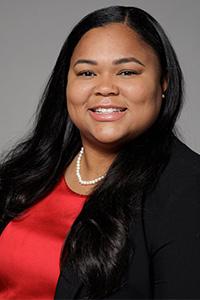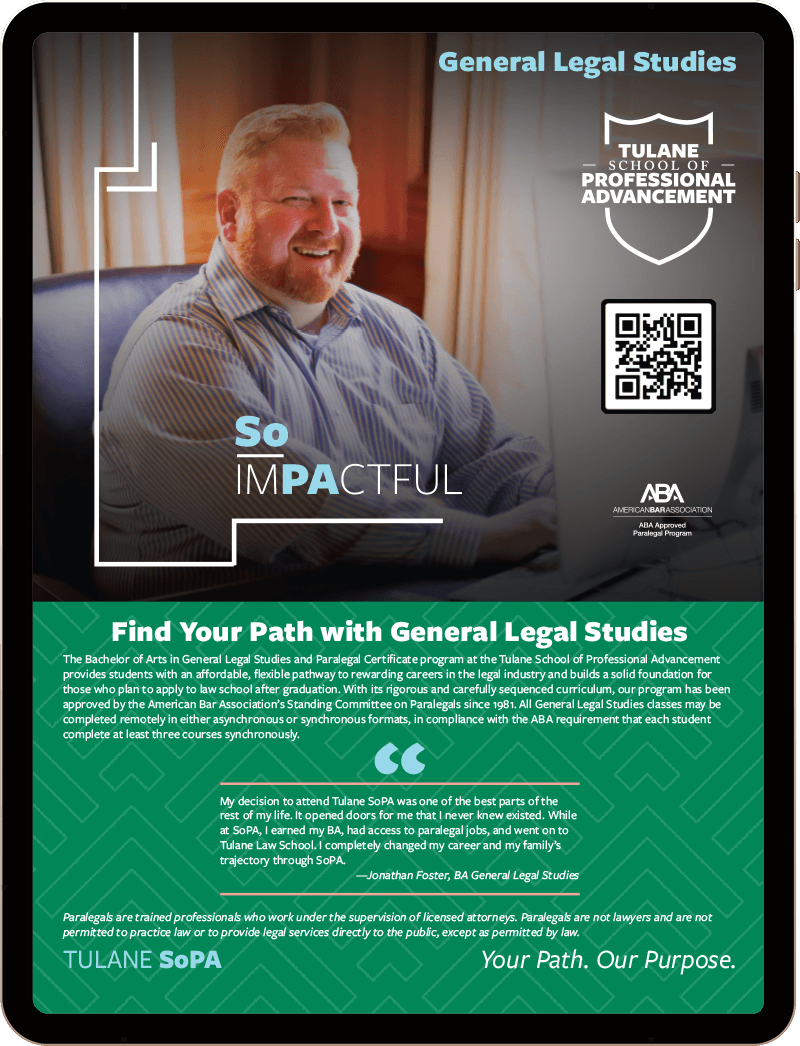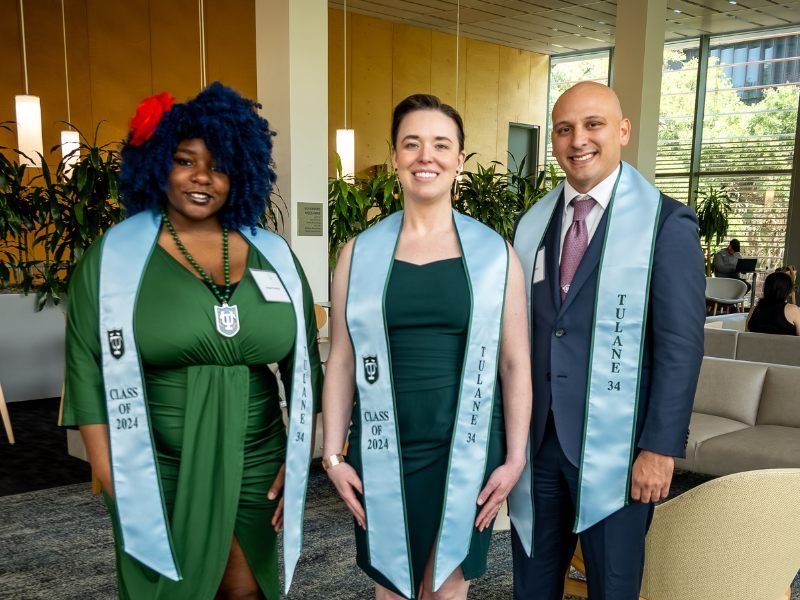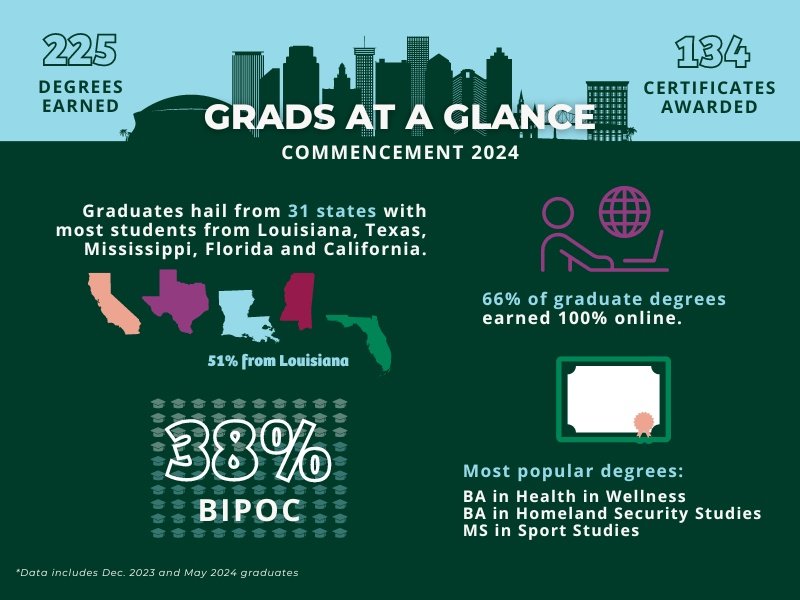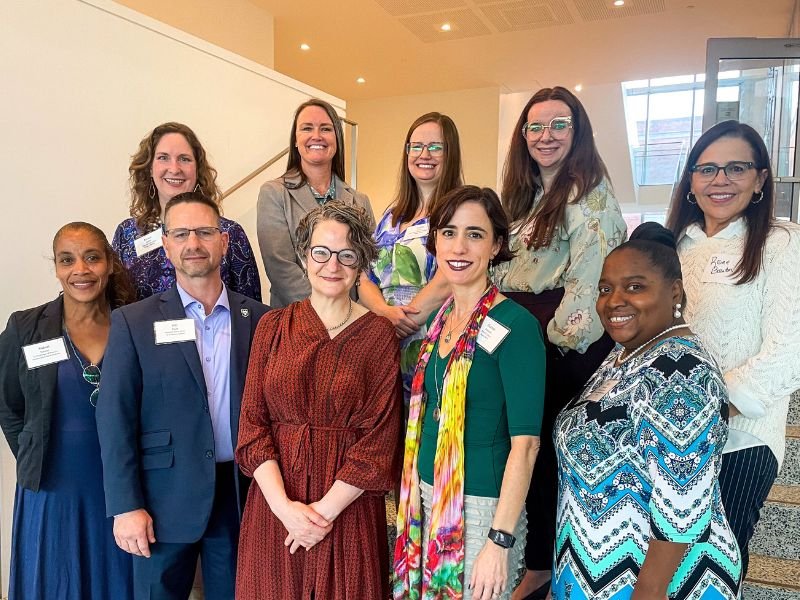General Legal Studies
Affordable Tuition No Test Scores Rolling Admission Three Start Dates Expert Faculty
Take the Next Step
By submitting this form, you agree to receive information about the Tulane School of Professional Advancement’s programs via email, phone and/or text. You may opt out at any time.

General Legal Studies
The General Legal Studies Program provides our students with the skills, wisdom, and integrity to create, communicate and conserve knowledge and to pursue careers as efficient, ethical legal professionals who are prepared to assist attorneys in courts, governmental agencies, law firms, and other legal services offices, or to apply to law school after graduation, if they choose.
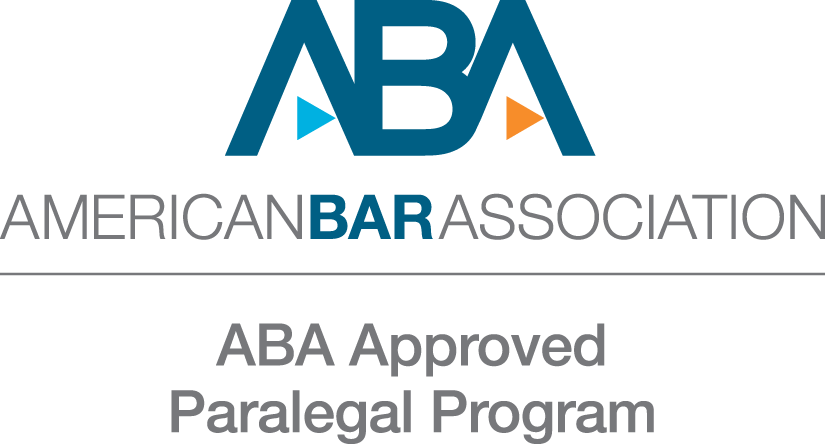
ABA Approved
Both the General Legal Studies Bachelor of Arts degree plus Paralegal Certificate and the Post-Baccalaureate Certificate in Paralegal Studies were approved by the American Bar Association’s Standing Committee on Paralegals in the 1980s, making ours the oldest ABA-approved program in the region. Our general legal studies curriculum reflects the rigor and quality that ABA requires and legal employers demand.
Paralegals are trained professionals who work under the supervision of licensed attorneys. Paralegals are not lawyers and are not permitted to practice law or to provide legal services directly to the public, except as permitted by law.
Degrees & Certificates
To ensure compliance with ABA requirements, all students must complete at least three GLSP classes (9 credits) via in-person or synchronous remote format. The course prefix for all General Legal Studies courses has changed to GLSP (formerly PARA).
Online Bachelor's Degree
- ABA-approved
- Learn legal research, writing, and analysis, along with law office technology and other practical aspects of the legal profession.
- Curriculum includes a practicum course with a 100-hour law office internship component.
- 120 credits (36 major credits)
- A minimum of nine credits (three courses) must be completed in person or in synchronous remote format.
- Simultaneously earn the General Legal Studies Bachelor of Arts degree and a Paralegal Certificate.
- Find degree-specific information here.
Post-Baccalaureate Certificate
- ABA-approved
- A minimum of nine credits (three courses) must be completed in person or in synchronous remote format.
- Learn more.
Minor
- For students who are majoring in other disciplines and wish to develop general knowledge of U.S. law in preparation for law school or other pursuits.
- May be completed entirely online.
- The General Legal Studies Minor is not approved by the American Bar Association’s Standing Committee on Paralegals, does not yield a Paralegal Certificate on completion, and is not intended to prepare graduates for careers as paralegals.
- See all course requirements for the GLSP minor.
Accelerated Degrees
- Upon earning 75 credits toward a bachelor’s degree, including all 36 credits in the major, students may apply for admission to a SoPA master’s degree program.
- Subject to program director’s approval.
- Learn more.

SoPA Student Spotlight
"I worked full-time as a ramp supervisor at the airport while I completed my degree at Tulane thanks to the SoPA program that is tailored to help working professionals obtain a degree with online and night classes."
Christina Gourley
Tulane SoPA class of 2018
Faculty Who Practice What They Teach
Our program faculty is composed entirely of practicing attorneys and paralegals, who offer our students the benefit of real-world legal experience and immediate access to the professional networks that support career success. In addition to core legal skills courses that emphasize legal technology, research, writing, and analysis, we offer a full menu of electives that allow you to explore important areas of substantive law, followed by a final-semester practicum class composed of a 100-hour internship and classroom instruction focusing on job search skills.

SoPA Faculty Feature
"As a SoPA professor and lawyer with over a decade of experience, I prepare students with the practical knowledge and skills they need to excel in their legal careers."
Jacqueline Putnam Epstein, J.D.
General Legal Studies
Professor of Practice
Legal Studies Graduates at Work
Many of our graduates are now pursuing successful careers as paralegals in law firms, courts, corporations, government agencies, non-profit legal service providers, and other legal offices, while others enter law school and become attorneys. Graduates of our program have access to a robust network of alumni and potential employers. General Legal Studies graduates are employed across the region, pursuing fulfilling careers as:
- Paralegal
- Office Managers
- Human Resource Professionals
- Court Clerks
- Investigator
- Contract Administrator
- Insurance Adjusters

Legal Studies Graduates at Work
Many of our graduates are now pursuing successful careers as paralegals in law firms, courts, corporations, government agencies, non-profit legal service providers, and other legal offices, while others enter law school and become attorneys. Graduates of our program have access to a robust network of alumni and potential employers. General Legal Studies graduates are employed across the region, pursuing fulfilling careers as:
- Paralegal
- Office Managers
- Human Resource Professionals
- Court Clerks
- Investigator
- Contract Administrator
- Insurance Adjusters

Engaging & Flexible Student Experience, On-Campus & Online
Partnerships that translate into industry certifications, credit for experience, & career advancement opportunities.
We’ve developed the most interactive courses around.
Our courses are constantly refreshed and informed by what leaders in the legal field expect from graduates.
Navigate degree requirements and prepare for the workforce with help from our academic advisors and career counselor.
Legal Studies Program Learning Outcomes
The General Legal Studies Program provides our students with the skills, wisdom, and integrity to create, communicate and conserve knowledge and to pursue careers as efficient, ethical legal professionals who are prepared to assist attorneys in courts, governmental agencies, law firms, and other legal services offices, or to apply to law school after graduation, if they choose.
On completion of the General Legal Studies Program curriculum, graduates will have the knowledge and skills to:
- Describe and analyze the jurisdictions and functions of the state and federal civil, criminal, and administrative court systems.
- Perform legal research and factual investigations using both print and electronic methods and summarize findings in legal memoranda and briefs.
- Cite authorities consistent with the adopted legal citation manual (The Bluebook: A Uniform System of Citation.)
- Draft memoranda of law and legal correspondence.
- Identify, draft, and file standard pretrial and litigation documents in Federal and State Courts.
- Use industry-standard law office technology to organize and manage documents, files, billing data, and dockets for trial and other law practice management purposes.
- Identify and apply the ABA Model Rules of Professional Conduct and the NALA and NFPA ethics guidelines.
- Describe and analyze the differences among the jurisdictions and functions of the state and federal civil, criminal, and administrative court systems.
- Interpret and apply legal terminology.
- Describe the primary differences between the Louisiana Civil Law legal system and the common law legal system.
- Perform legal research using both traditional and electronic methods and summarize findings in legal memoranda and briefs.
- Perform factual investigations using both traditional and electronic methods.
- Cite authorities consistent with the adopted legal citation manual (The Bluebook: A Uniform System of Citation).
- Draft memoranda of law and legal correspondence.
- Locate, identify, and apply state and federal court filing and e-filing requirements.
- Draft the documents required to initiate, file, and respond to a civil action.
- Draft discovery requests and responses and pre-trial motions.
- Use industry-standard law office technology to organize and manage documents, files, billing data, and dockets for trial and for other law practice management purposes.
- Identify and apply the rules and principles of legal ethics applicable to the paralegal profession.
Meet the Advisory Board
The General Legal Studies curriculum is guided by experienced faculty and a knowledgeable advisory board that helps ensure the most up-to-date and relevant skillsets are being taught to our students.
Featured Members
- Judicial Law Clerk, Division G, Orleans Parish Civil District Court
- Paralegal, Database & Certified Records Manager, City of New Orleans
- Talent Acquisition Manager, Southshore Region Community Hospitals at Ochsner Health System
- Senior Partner, Law Offices of Steven B. Witman
Facts at a Glance
Tulane SoPA accepts students on a rolling basis, year-round. Start dates every August, January, and May. We never require test scores or recommendations. Visit our Admissions Process page to learn more.
All tuition is charged by the credit hour and we have minimal fees. Visit our tuition page to see our current tuition rates and use our net price calculator.
We strive to make a Tulane SoPA education affordable for all students. Learn about financial aid, discounts and scholarship opportunities here.
Earn credit for your work experience through a portfolio assessment. Undergraduates can earn up to 24 portfolio credits. Graduate students can earn up to 6 portfolio credits.
SoPA offers career advising to all enrolled students.
Bachelor’s Degree Programs and Paralegal Certificate
The General Legal Studies Bachelor of Arts (BA) degree and accompanying Paralegal Certificate, awarded simultaneously, require 120 credits for completion, including 36 credits in the GLSP major. Carefully sequenced coursework begins with core skills classes that emphasize legal research, writing, and analysis, along with law office technology and other practical aspects of the legal profession. In ensuing semesters, upper-level electives allow you to explore important areas of substantive law. Finally, the practicum course, with its 100-hour law office internship and classroom component, lets you apply your new skills in a professional setting, while developing professionalism and career success skills in the classroom.
Our GLSP courses are offered in asynchronous (fully online), synchronous remote (weekly meetings via Zoom), and in-person formats. Subject to the ABA requirement that each student complete at least 3 classes (9 credits) synchronously, you may take your GLSP classes from wherever you may be, in the format that suits your needs and preferences.
Lambda Epsilon Chi Honor Society
The General Legal Studies Program at Tulane University’s School of Professional Advancement is pleased to provide our students with the opportunity to earn induction into our chapter of Lambda Epsilon Chi (LEX), the academic honor society that recognizes those who demonstrate superior academic performance in paralegal and legal studies programs at member institutions of the American Association for Paralegal Education (AAfPE).
To ensure that membership in LEX is a meaningful academic honor within Tulane School of Professional Advancement and a recognized indication of superior academic achievement in the legal community we serve, the General Legal Studies Program at Tulane’s School of Professional Advancement defines “Superior Academic Performance” to include students and graduates of the General Legal Studies Bachelor of Arts degree program who have attained an overall GPA of at least 3.4 and a major GPA of at least 3.5; and students and graduates of the Post-Baccalaureate Certificate Program who have attained a GPA of at least 3.5.
Members are indicted in a ceremony each Spring. All inductees receive pins and certificates, and undergraduates receive purple and gold satin sashes to wear atop their regalia at commencement.
For additional information, please contact General Legal Studies Program Director Robyn Ice.
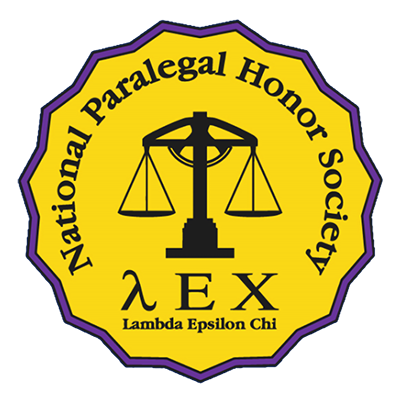
Frequently Asked Questions
Students who live outside the New Orleans area can participate in our in-person or synchronous classes via Zoom. In these classes, students and instructors meet and interact one evening per week, typically from 6:00 P.M. to 8:50 P.M., with participants joining from the classroom in campus or from remote locations, via Zoom. Assignments and examinations are circulated via Canvas, our learning management system.
Yes, with the exception of those who already are employed as paralegals, all students are required to complete GLSP 5900 – General legal Studies Practicum, which includes a 100-hour law office internship and a classroom component that focuses upon professionalism, legal ethics, and career success skills.
No, we assist you every step of the way. The General legal Studies Program maintains a pool of participating internship law offices that includes large and small law firms and non-governmental organizations throughout the region, covering a variety of practice areas.
The General Legal Studies Program provides several avenues through which you may learn more about the practice of law and the broad world of legal services. All members of our adjunct faculty work full-time as attorneys or paralegals in private practice, government, the court system, in-house, and other areas. All are accessible and happy to help our students. The GLSP also partners with the New Orleans Paralegal Association (NOPA), whose Paralegal Mentoring Program offers tremendous support to our students. Not sure who to call? Contract Program Director, Robyn Ice.
For these questions, the GLSP’s Peer Mentoring program is ready to help! Contact Program Director, Robyn Ice. You will be matched with a senior GLSP student who will support and guide you toward success. For all academic questions (and declaring your major), please always reach out to the Assistant Director of Academic Advising, Colleen Timmons, who will advise you in choosing the classes you need, in the correct sequence, to ensure timely and successful completion of your degree.
Tulane’s General Legal Studies Program does not accept the transfer of credits for paralegal courses completed at paralegal or legal studies programs that were not approved by ABA’s Standing Committee on Paralegals at the time the courses were taken.
Consistent with Tulane SoPA’s undergraduate credit transfer policy, students pursing the General Legal Studies BA may be permitted to transfer in up to 18 (50%) of the 36 legal studies/paralegal course credits required for the GLSP major, provided each course (1) meets all SoPA undergraduate course transfer requirements; (2) was completed at a paralegal or legal studies program that was approved by ABA’s Standing Committee on Paralegals at the time the class was completed; and (3) has been reviewed and approved by the General Legal Studies Program Director.
While the General Legal Studies Program provides a well-rounded legal education, you can tailor your experience by choosing electives that align with your interests, such as family law, intellectual property, real estate, criminal, or bankruptcy law. Your practicum internship further boosts your expertise by giving you hands-on experience in a legal setting that matches your career goals.






